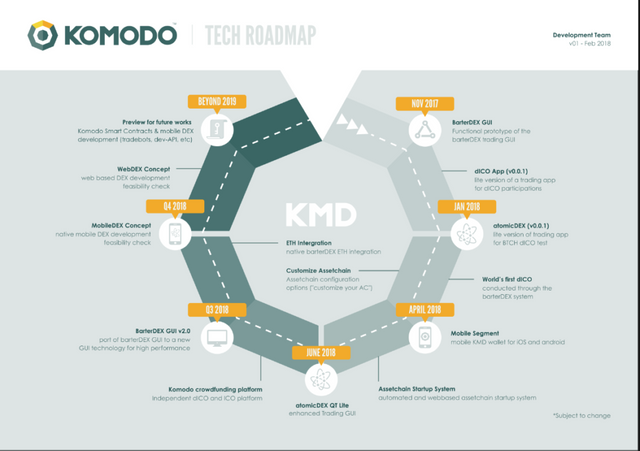Komodo (KMD): The Anonymous Crypto Ecosystem
Komodo (KMD): The Anonymous Crypto Ecosystem
Komodo (KMD) is a pretty interesting project that has mostly been under the radar. Let's look into it to see what it has to offer. It is initially a Zcash fork but a lot of other functionalities have been built upon it. Komodo used a Delayed proof-of-work (dPoW) consensus mechanism. This mechanism uses the chosen PoW network as storage space for backups of transactions happening on Komodo's blockchain. The chosen PoW network is currently Bitcoin. In the case of an attempted attack, only one copy of the Komodo blockchain would allow the system to overwrite any of the attackers' attempted changes.(html comment removed: more)
In the case of conflicts that arise concerning transactions that are older than the most recent backup, the consensus mechanism looks at the the backups in the chosen PoW blockchain to find the accurate record.
This makes the network very secure. The chosen PoW network is Bitcoin but this is decided by notary nodes, chosen through a stake-weighted vote. These nodes can choose to switch to another PoW network. This could happen for example if the majority of hash power moves to a blockchain other than Bitcoin. The system is thus very flexible and is not completely dependent on the success of Bitcoin, as long as another PoW network survives. All this is possible due to the underlying technology called Iguana Core. These nodes are paid from a pool of around 50 KMD daily.
The reason it was designed this way is to profit from the security advantages from the PoW system, avoid the need to have more hash power by creating a new PoW system and avoid a proof-of-stake system because of security risks.
Functionalities
As mentioned before, while Komodo is a fork of Zcash, it offers way more functionalities than the anonymous currency.
Asset chains
Entrepreneur and diverse parties can decide to build independent blockchains called asset chains in the Komodo system. These chains are as secure as Komodo's main chain. The only difference is that the main chain notarizes to an exterior PoW network, being Bitcoin for the moment, whereas the asset chains are being notarized into to the Komodo main chain.
Decentralized ICOs (DICO)
The Komodo platform offers the possibility to launch decentralized ICOs. This is an improvement compared to the current model because:
- Anyone can participate
- Probabilities of a hack occuring are greatly reduced
- Participants can participate in a ICO without anyone knowing
BarterDEX
BarterDEX is Komodo's own decentralized exchange. The exchange uses a variation of the atomic swap protocol to exchange coins.Jumblr
Jumblr is Komodo's native privacy feature. It uses zk-SNARKs addresses just like Zcash. With the help of the BarterDEX, Jumblr can provide the feature not only for KMD but also for any cryptocurrency connected to the Komodo ecosystem.If you want to know more technical details about any of the previously discussed functionalities, everything is well explained in their whitepaper.
What's to Come
As you can see below, the big team at Komodo still has plans to develop the Komodo ecosystem. Future developments include a mobile wallet, a crowdfunding platform, ETH integration and much more.

Posted from my blog with SteemPress : https://satoshi.blog/2018/06/26/komodo-kmd-the-anonymous-crypto-ecosystem/
Very interesting project, and great analysis.
Coins mentioned in post: